Receive ENBOTS Meeting Reports |
||
|
Receive our ENBOTS bulletins and reports by email: |
||

| Follow @enbclimate | ||

Loading... |
||
|
Receive emailed updates with the news articles above plus related information and announcements from our CLIMATE-L community mailing list: |
||
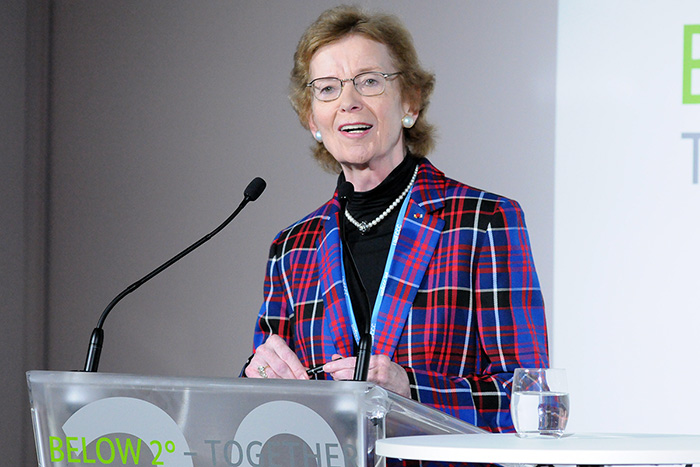 Mary Robinson, Special Envoy of the UN Secretary-General on Climate Change, during the InsuResilience: The Climate Risk Insurance Initiative side event.
Mary Robinson, Special Envoy of the UN Secretary-General on Climate Change, during the InsuResilience: The Climate Risk Insurance Initiative side event.|
The following side events were covered by ENBOTS on Saturday, 5 December 2015:
|
||
|
IISD Reporting Services, through its ENB on the Side (ENBOTS) Meeting Coverage, is providing web coverage, including photos and video, of an average of nine daily side events from the Paris Climate Change Conference - November-December 2015. | ||
Community Choice Energy: Power to the People! Presented by: Sequoia Foundation
This event, moderated by Tom Kelly, Director, Sequoia Foundation, focused on the role of community choice energy (CCE) in accelerating the transition to a low-carbon economy, hearing examples from throughout California, US.
Shawn Marshall, Lean Energy US, presented on the CCE model and provided an overview of national-, state- and municipal-level legislation relating to community energy. She emphasized that CCE does not require federal legislation, and in fact that the majority of progress in community choice energy in the US is occurring at the state level. She underscored successful community energy projects around the US, noting that programmes with broader social benefits tend to be more successful at retaining customers in the long term.
Cliff Rechtschaffen, Office of California Governor Jerry Brown, presented on how community energy can accelerate and catalyze the transition to a low carbon economy. He contextualized progress by highlighting multisector, state-level climate goals addressing cap-and-trade, transport, forestry, Short-Lived Climate Pollutants (SLCPs), buildings, soils and decarbonizing the electric system. He noted former Governor Arnold Schwarzenegger's Executive Order to reduce greenhouse gas emissions by 80% of 1990 levels by 2050, which is spurring the creation of the most clean energy jobs in any state in the US.
Dawn Weisz, CEO, Marin Clean Energy (MCE), explained MCE was the first clean energy CCE in Western US. She explained its structure is a public-private hybrid model, being a public agency but using private renewable energy infrastructure. Underscoring that the model does not add to the state’s tax burden, she said “the programme is just redirecting a revenue stream that already exists”, and has succeeded in eliminating 63,500 MT of CO2 between 2010-2013. Weisz highlighted MCE now has more than 170,000 customers, but that they also work with local citizens on energy efficiency, saying “the cleanest energy is the energy we don’t use, of course.”
Tom Butt, Mayor, City of Richmond, California, talked about the energy transition in the city, highlighting a shift from 27% to 56% renewables which has saved rate-payers over US$1 million. On challenges to further improvement, he suggested “people just don’t like change”, but noted the city’s plans to build a 10.5 MW solar farm.
In the ensuing discussion, participants discussed, inter alia: the challenges of addressing “higher hanging fruit” once energy transition is further under way; collaboration among similar CCE programmes in different municipalities; rural community cooperative models; and how to achieve meaningful civic engagement.
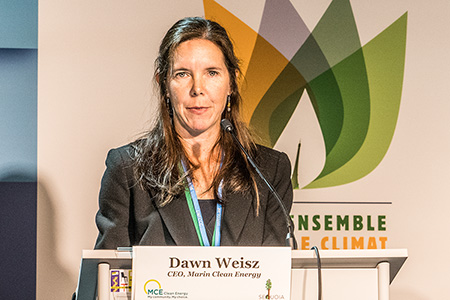 Dawn Weisz, CEO, MCE, presented on California’s first community choice energy programme, which now has more than 170,000 customers.
Dawn Weisz, CEO, MCE, presented on California’s first community choice energy programme, which now has more than 170,000 customers.
| 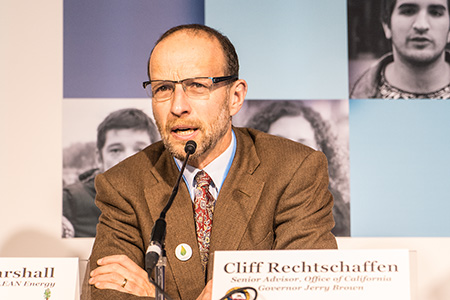 Cliff Rechtschaffen, Office of California Governor Jerry Brown, said California has arguably the most progressive greenhouse gas emission policies in the world.
Cliff Rechtschaffen, Office of California Governor Jerry Brown, said California has arguably the most progressive greenhouse gas emission policies in the world.
|
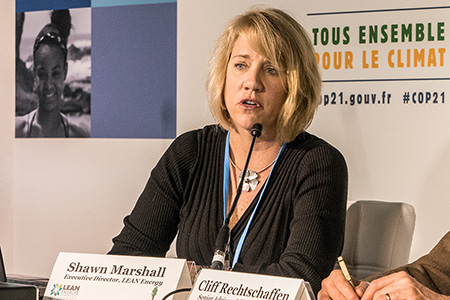 Shawn Marshall, Lean Energy US, said state-level regulations are taking the lead in renewable energy standards and robust cap-and-trade systems throughout the US
Shawn Marshall, Lean Energy US, said state-level regulations are taking the lead in renewable energy standards and robust cap-and-trade systems throughout the US
| 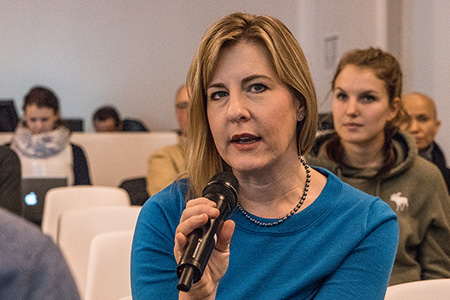 A participant from Minnesota asks panelists how community ownership models such as energy cooperatives fit into the CCE model.
A participant from Minnesota asks panelists how community ownership models such as energy cooperatives fit into the CCE model.
|
 Panel (L-R): Shawn Marshall, Lean Energy US; Cliff Rechtschaffen, Office of California Governor Jerry Brown; Dawn Weisz, MCE; and Tom Butt, Mayor, City of Richmond, California.
Panel (L-R): Shawn Marshall, Lean Energy US; Cliff Rechtschaffen, Office of California Governor Jerry Brown; Dawn Weisz, MCE; and Tom Butt, Mayor, City of Richmond, California.
|
European Union and Gulf Cooperation Council Collaboration on Economic Diversification Presented by: Gulf Cooperation Council (GCC)
This side event, moderated by Mohammed Al Shamsi, Saudi Arabia, highlighted initiatives between the EU and GCC on economic diversification and identified barriers and solutions for scaling up investments in low-carbon technologies. Al Shamsi noted efforts in GCC countries since 1980 to diversify their oil-based economies, highlighting that evidence shows they are on a path towards low-carbon economic development.
Mustafa Babiker, Senior Consultant, Saudi Aramco, underscored that economic diversification is key to sustainable development and will allow economic growth alongside improvements in the social well-being of the population. He noted that despite improved trends, challenges remain, including heavy reliance of the GCC economies on the oil sector, especially in terms of exports and revenues. He noted the increase of foreign direct investment since 2000 and presented opportunities for diversification in different economic sectors, including petrochemicals, high technology and financial services. He also discussed challenges in with the region’s agricultural potential, stressing limited water availability, and in the manufacturing sector, underscoring limited competitiveness and domination by low value-added activities.
Jon Price, University of Sheffield, presented on diversification through innovation, manufacturing, co-production and training. He provided an overview of the transformation in Sheffield, from a fossil fuel intensive production economy in the 1980s to the Sheffield Advanced Manufacturing Park which provides opportunities to develop industry across a range of sectors. He presented the main partnerships that enabled the transformation, as well as efforts regarding training and capacity building. He underscored that the transformation of a coal mine in the area has led to wealth creation for the economy, noting that the application could be replicated in GCC countries.
Addressing solar driven economic diversification in the GCC countries, Anthony Ryan, University of Sheffield, drew attention to solar thermal technologies and their potential for agricultural development in the GCC region. Noting that traditional outdoor agriculture in the GCC countries makes no sense, as the climate “is too hot, too dry and the region too sandy,” he provided examples of solar thermal plants in, among other places, Spain and Australia. He described the process, based on sea water and sunshine, which involves, inter alia: solar thermal desalination; solar powered heliostats and pumps; and evaporative cooling for temperature and relative humidity in greenhouse hydroponic/drip irrigation. He offered insights into the integration of technologies to diversify business growth in GCC countries, including: solar desalination technologies; genetically modified cultivars optimized for hydroponics; and the transition from oil and gas to polyolefins.
In the ensuing discussion, participants addressed, inter alia: 3-D printing applications; the importance of capacity building and human resources; the service sector in the GCC countries; and cost effectiveness, including returns on investments in solar agriculture.
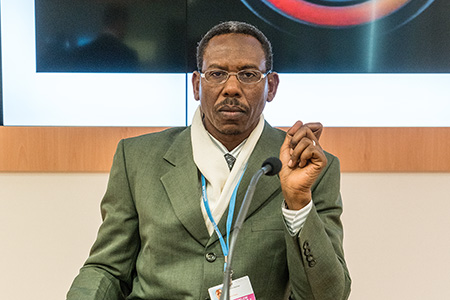 Addressing economic diversification efforts in the GCC, Mustafa Babiker, Saudi Aramco, noted that oil's contribution to the GDP declined from over 40% in 1980 to less than 30% in 2010.
Addressing economic diversification efforts in the GCC, Mustafa Babiker, Saudi Aramco, noted that oil's contribution to the GDP declined from over 40% in 1980 to less than 30% in 2010.
| 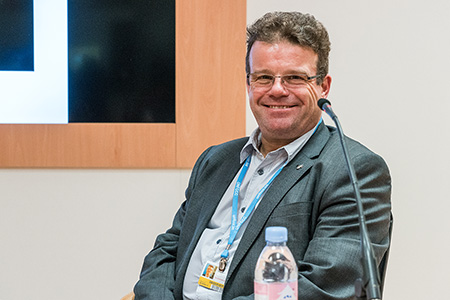 Anthony Ryan, University of Sheffield, presented on solar thermal technologies and its potential for agricultural development in GCC countries.
Anthony Ryan, University of Sheffield, presented on solar thermal technologies and its potential for agricultural development in GCC countries.
|
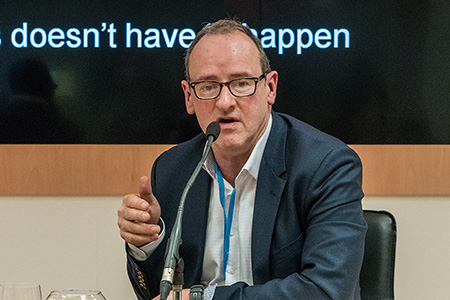 Jon Price, University of Sheffield, provided insights from the Sheffield Advanced Manufacturing Park.
Jon Price, University of Sheffield, provided insights from the Sheffield Advanced Manufacturing Park.
| 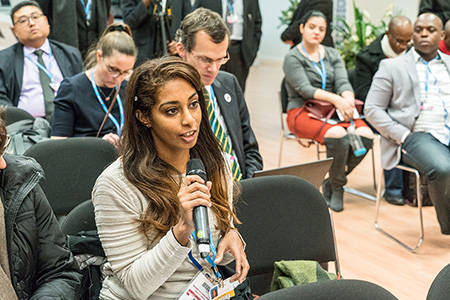 A panelist engages with the panel during the Q&A session.
A panelist engages with the panel during the Q&A session.
|
 Panel (L-R):
Mohammed Al Shamsi, Saudi Arabia; Mustafa Babiker, Saudi Aramco; Jon Price, University of Sheffield; and Anthony Ryan, University of Sheffield.
Panel (L-R):
Mohammed Al Shamsi, Saudi Arabia; Mustafa Babiker, Saudi Aramco; Jon Price, University of Sheffield; and Anthony Ryan, University of Sheffield.
|
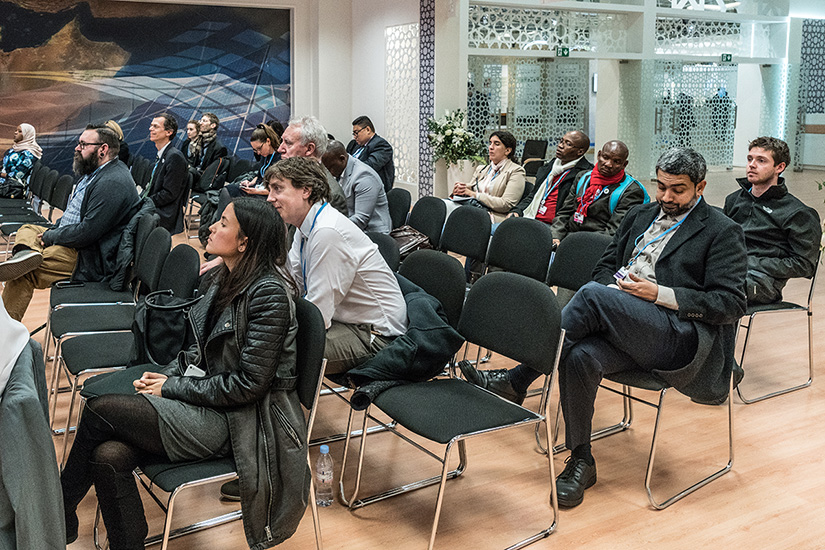
|
The Arctic Lessons
Presented by:
The University of Tromsø (UiT) - the Arctic University of Norway, Umeå University,
the University of Iceland, Aarhus University and the University of Lapland
This side event, moderated by Rasmus Bertelsen, UiT, addressed how the five Nordic countries contribute to global climate diplomacy, regulation, mitigation and adaptation through Arctic science, and shed light on how climate change affects the Indigenous Population in the Arctic region.
Anne Husebekk, Rector, UiT, noted that the Arctic winter may be cold and dark, but, contrary to what most people think, not lifeless. She pointed to the surface layers of the Arctic Ocean, which are beaming with life and noted that due to vulnerability to external factors, tomorrow’s Arctic will be different.
Brynhildur Davíðsdóttir, University of Iceland, presented the three energy transitions of the 20th century in Iceland, which led successively from peat to coal, oil and finally renewable energy, which today accounts for 85% of total primary energy supply. She then called for another transition addressing maritime activities and road transport, noting that it is feasible both technologically and economically, and will involve benefits for consumers.
Berit Kristoffersen, UiT, said that Arctic States should balance their economic interests with ecological and social responsibility. She underscored that petroleum and climate policies are disconnected and defined opportunistic adaptation as the idea that the economic benefits of climate change should be prioritized over efforts to address its causes.
Addressing governance of fossil fuels in the Arctic, Cécile Pelaudeix, Aarhus University, stressed that inclusive management and trust-based contracts are needed. She highlighted that while Arctic countries do not drill for energy security, energy constitutes a commercial good for Canada, a public good for Norway and a strategic goal for Greenland.
Ilona Mettiäinen, University of Lapland, underscored that regional and local level action plans are crucial for adaptation to climate change in the region. She noted that despite apparent similarities, adaptation needs and hence necessary solutions may differ significantly in different parts of the Arctic. She stressed bottom-up approaches and noted that strategic planning can be a good way to mainstream climate mitigation and adaptation efforts.
Focusing on the Sami people, Peter Sköld, Umeå University, noted that climate change is not only a threat to endangered plants and species but also to ancient Indigenous cultures all over the world. He addressed: reindeer herding and related rights; main threats to herding; traditional knowledge; links between climate change and Sami health; and lamented that the international community is more interested in ice than in people.
Aili Keskitalo, President of the Sami Parliament of Norway, noted that to understand the Arctic, it is also necessary to understand its Indigenous Peoples, and stressed that scientific research is contributing to this knowledge. She highlighted that in addition to the Arctic paradox, an indigenous Arctic paradox may be in place, stating mining activities and windmills pose a serious threat to reindeer herding and the Sami culture.
During discussions, participants addressed, inter alia: addressing mitigation and adaptation activities simultaneously; the strategic focus of different Arctic countries; the different Arctic narratives in climate negotiations; and ways to connect petroleum and climate policies.
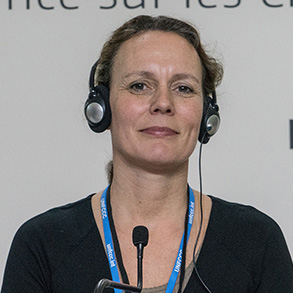 Brynhildur Davíðsdóttir, University of Iceland, stressed that responsible development of resources in the Arctic is key to blue and green growth.
Brynhildur Davíðsdóttir, University of Iceland, stressed that responsible development of resources in the Arctic is key to blue and green growth. | 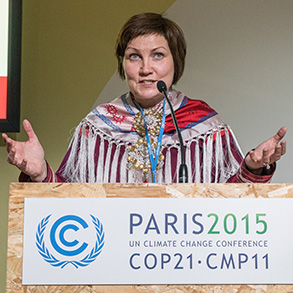 Aili Keskitalo, President of the Sami Parliament of Norway, expressed the fear of Indigenous Peoples, in the Arctic that climate change will hit them harder than others and they will lose their traditional way of life.
Aili Keskitalo, President of the Sami Parliament of Norway, expressed the fear of Indigenous Peoples, in the Arctic that climate change will hit them harder than others and they will lose their traditional way of life.
| 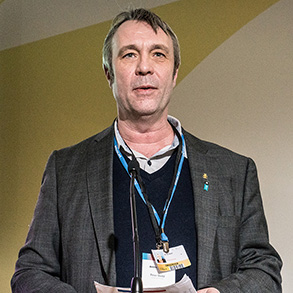 Peter Sköld, Umeå University, noted that the ice is more interesting than the people for the international community.
Peter Sköld, Umeå University, noted that the ice is more interesting than the people for the international community.
|
 Panel (L-R):
Rasmus Bertelsen, UiT; Brynhildur Davíðsdóttir, University of Iceland; Berit Kristoffersen, UiT; Anne Husebekk, Rector, UiT; Cécile Pelaudeix, Aarhus University; Ilona Mettiäinen, University of Lapland; and Peter Sköld, Umeå University
Panel (L-R):
Rasmus Bertelsen, UiT; Brynhildur Davíðsdóttir, University of Iceland; Berit Kristoffersen, UiT; Anne Husebekk, Rector, UiT; Cécile Pelaudeix, Aarhus University; Ilona Mettiäinen, University of Lapland; and Peter Sköld, Umeå University
|
Role of Oil & Gas Technology to address Climate Change Challenges Presented by: Organization of Arab Petroleum Exporting Countries (OAPEC)
This side-event was moderated by Tidjani Niass, Saudi Aramco.
Emphasizing the need for finding solutions for carbon capture, usage and storage (CCUS), Ahmad Belhoul, Masdar, presented on an Emirates Steel Industries CCUS project under the auspices of “Al Reyadah,” a joint venture between Masdar and Abu Dhabi National Oil Company. He explained that the project is the Middle East’s first commercial scale CCUS facility and is expected to sequester 800,000 tonnes of CO2 annually.
Noting the objective is to sequester CO2, not to recover oil, Ahmed Al-Eidan, Saudi Aramco, presented a pilot project of carbon capture and enhanced oil recovery (EOR). He explained the project will capture 40 million standard cubic feet of CO2 per day, highlighting the pioneering nature of its monitoring and surveillance system.
Anwar Sarkhouh, Ministry of Electricity and Water, Kuwait, presented on GHG reductions from energy savings in Kuwait, including through district cooling and water oil emulsion.
Hazim Ali Al-Muraikhi, Qatargas, presented on the Jetty Boil-off Gas Recovery Project, a $1bn project to end flaring from the six liquefied natural gas berths at Ras Laffan Port. He explained the project is expected to help recover 29 billion cubic feet of gas a year, which will be enough to produce 750MW of power to serve 300,000 homes.
Ahmed Abd Rabbo Mohammed, Ministry of Petroleum, Egypt, presented on experience with compressed natural gas as a vehicle fuel. He explained the project entailed the conversion of taxis and private vehicles to natural gas, with benefits both for consumers and for the environment. He announced plans to increase utilization of compressed natural gas from 2016 to 2019.
Ensuing discussions focused, inter alia, on: efficiency in CO2 transport; scaling up of CCUS; cost effectiveness of the use of natural gas for transport; support for smaller oil and gas companies to reduce their emissions; and fast maturation of CCUS technologies.
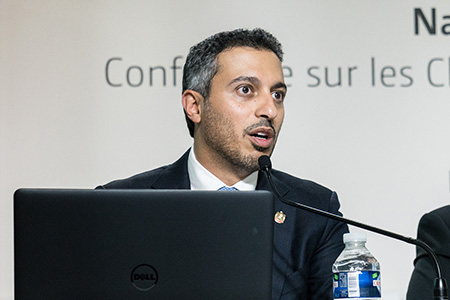 Ahmad Belhoul, Masdar, presented a CCUS project carried out under the auspices of “Al Reyadah.”
Ahmad Belhoul, Masdar, presented a CCUS project carried out under the auspices of “Al Reyadah.”
| 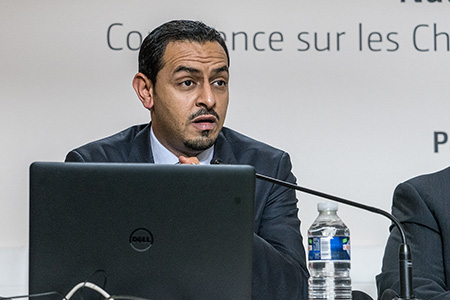 Ahmed Al-Eidan, Saudi Aramco, presented experience with a project of carbon capture and enhanced oil recovery.
Ahmed Al-Eidan, Saudi Aramco, presented experience with a project of carbon capture and enhanced oil recovery.
|
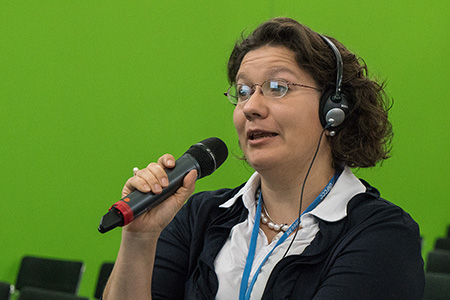
| 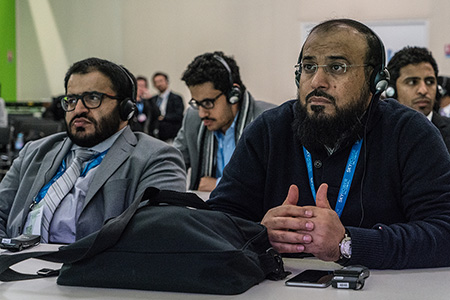
|
 Panel (L-R):
Ahmad Belhoul, Masdar; Hazim Ali Al-Muraikhi, Qatargas; Tidjani Niass, Saudi Aramco; Ahmed Al-Eidan, Saudi Aramco; Anwar Sarkhouh, Ministry of Electricity and Water, Kuwait; and Ahmed Abd Rabbo Mohammed, Ministry of Petroleum, Egypt.
Panel (L-R):
Ahmad Belhoul, Masdar; Hazim Ali Al-Muraikhi, Qatargas; Tidjani Niass, Saudi Aramco; Ahmed Al-Eidan, Saudi Aramco; Anwar Sarkhouh, Ministry of Electricity and Water, Kuwait; and Ahmed Abd Rabbo Mohammed, Ministry of Petroleum, Egypt.
|
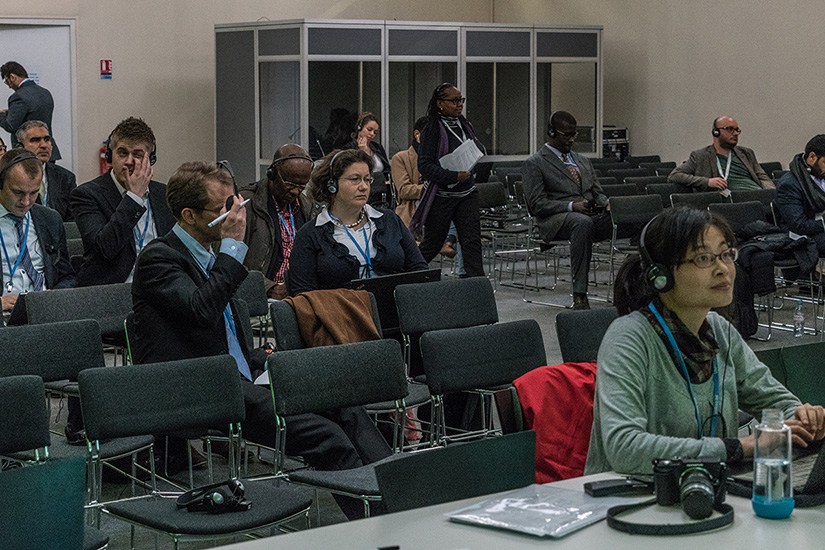
|
InsuResilience: The Climate Risk Insurance Initiative Presented by: the German Federal Ministry for Economic Cooperation and Development (BMZ) and the Group of Seven (G7)
This event was moderated by Mary Robinson, Special Envoy of the UN Secretary-General on Climate Change, who explained that the G7 launched InsuResilience earlier in 2015, calling it a “vital piece” to the climate change solution, although not a substitute for reducing climate risks.
Underscoring the need to act “decisively and pre-emptively,” Thomas Silberhorn, Parliamentary State Secretary, BMZ, Germany, explained that InsuResilience aims to provide 400 million people in developing countries with access to insurance against extreme events by 2020. He announced a rapid action package to intensify support for vulnerable countries’ efforts to manage climate change related disaster risk and to build resilience, by strengthening existing insurance related facilities and initiatives.
Calling for supporting “solutions that exist” and scaling up “solutions that have worked,” Ngozi Okonjo-Iweala, Chair, Governing Board, African Risk Capacity (ARC), informed participants that the ARC was established by the African Union to help improve member States’ capacity to better plan, prepare and respond to extreme weather events and natural disasters.
Recalling the impact of recent cyclones in the Pacific region, Henry Puna, Prime Minister, Cook Islands, shared insights on Pacific States’ efforts to become self-reliant in disaster response, including through the Pacific Catastrophe Risk Assessment and Financing Initiative (PCRAFI).
Identifying disaster prevention and recovery as key priorities, Annick Girardin, Minister of State for Development and Francophonie, France, explained that the Climate Risk Early Warning Systems (CREWS) Initiative, launched at COP 21, aims to extend the cover of climate risk and information early warning systems in Least Developed Country (LDCs) and Small Island Developing States (SIDS).
Isaac Anthony, Chief Executive Officer, Caribbean Catastrophe Risk Insurance Facility (CCRIF), expressed satisfaction with pledges at COP 21 to support the expansion of CCRIF, adding that the facility was recently restructured.
Calling resilience insurance “one of the smartest approaches to development,” Justine Greening, Secretary of State for International Development, United Kingdom, emphasized the need to unlock the potential of the insurance business to deal with climate change, and to support and scale up InsuResilience.
Announcing Japan’s support to InsuResilience, Kiyoshi Kodera, Vice-President, Japan International Cooperation Agency (JICA), emphasized the need to put the disaster risk agenda in the adaptation agenda.
Remarking the substantial growth of the sector, Michel Liés, CEO, Swiss Re, emphasized the need to scale up investment, as well as the importance of governments taking control of their disaster risk management.
Underlining that COP 21 is giving unprecedented elevation and priority to adaptation and resilience, Todd Stern, US Special Envoy for Climate Change, reiterated the announcement of an additional US$ 30 million to assist in climate resilience initiatives and to help vulnerable countries to increase their climate resilience.
Emphasizing that broadening and deepening insurance markets is essential for climate resilience, Rachel Kyte, Vice President and Special Envoy for Climate Change, World Bank Group, called for scaling up climate disaster risk insurance, in order to extend access to those who do not have it.
Cornelia Füllkrug-Weitzel, Chair, ACT Alliance, called for making sure that insurance policies are available to the poorest and most in need, and for anchoring loss and damage in the Paris agreement.
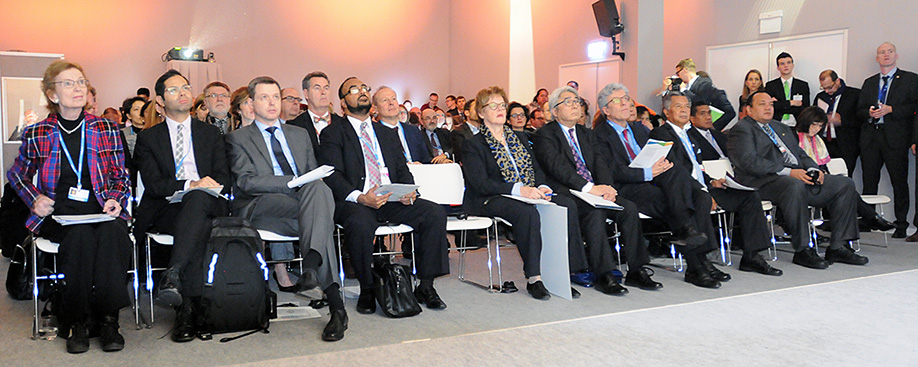
|
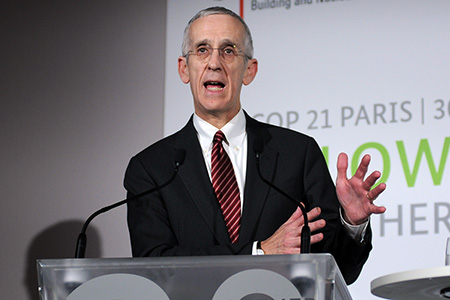 Todd Stern, US Special Envoy for Climate Change, emphasized: “we are making an agreement giving elevation and priority to adaptation and resilience like nothing that has even happened before.”
Todd Stern, US Special Envoy for Climate Change, emphasized: “we are making an agreement giving elevation and priority to adaptation and resilience like nothing that has even happened before.”
| 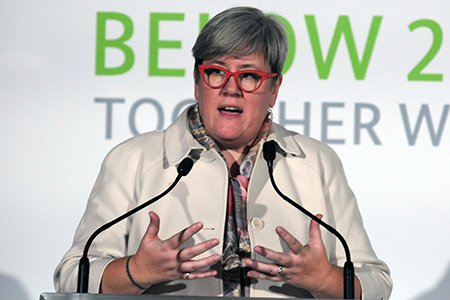 Rachel Kyte, Vice President and Special Envoy for Climate Change, World Bank Group, said that broadening and deepening insurance markets is essential for resilience.
Rachel Kyte, Vice President and Special Envoy for Climate Change, World Bank Group, said that broadening and deepening insurance markets is essential for resilience.
|
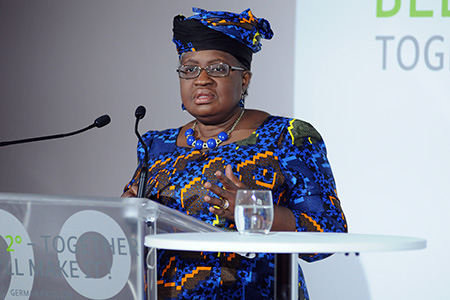 Ngozi Okonjo-Iweala, Chair, Governing Board, African Risk Capacity (ARC), called for supporting solutions that exist and for scaling up solutions that have worked.
Ngozi Okonjo-Iweala, Chair, Governing Board, African Risk Capacity (ARC), called for supporting solutions that exist and for scaling up solutions that have worked.
| 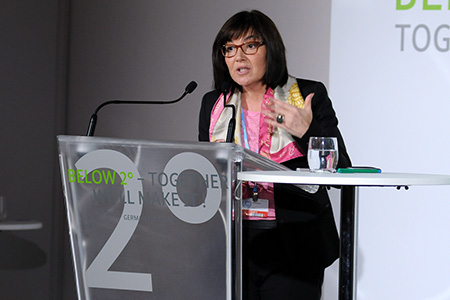 Annick Girardin, Minister of State for Development and Francophonie, emphasized that at COP21 adaptation and mitigation are being dealt with at the same level.
Annick Girardin, Minister of State for Development and Francophonie, emphasized that at COP21 adaptation and mitigation are being dealt with at the same level.
|
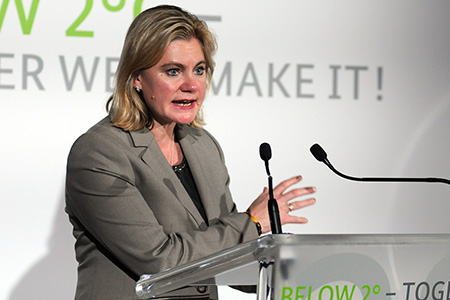 Justine Greening, Secretary of State for International Development, United Kingdom, explained that only a fraction of natural disasters related damage is dealt with by insurance.
Justine Greening, Secretary of State for International Development, United Kingdom, explained that only a fraction of natural disasters related damage is dealt with by insurance.
| 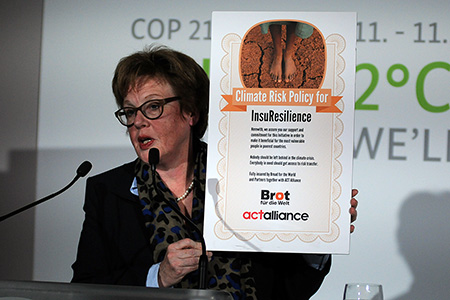 Cornelia Füllkrug-Weitzel, Chair, ACT Alliance, presenting a certificate of climate insurance.
Cornelia Füllkrug-Weitzel, Chair, ACT Alliance, presenting a certificate of climate insurance.
|
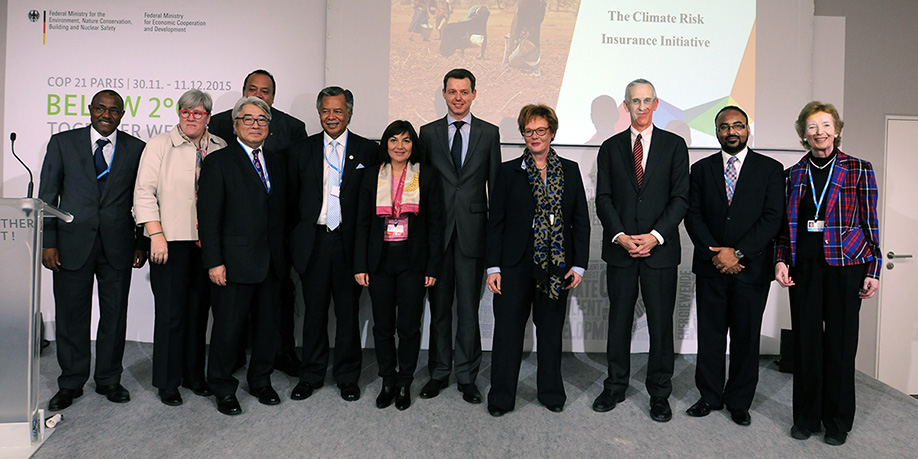
|
Examination of How Nations Have and Should Consider Equity and Justice in Setting INDCs Presented by: Pennsylvania Environmental Resource Consortium (PERC), National Spiritual Assembly of the Baha'is of the United States, Unitarian Universalist Association (UUA), and Widener University
This session, moderated by John Dernbach, Widener Law School, considered the role of ethics, justice and faith-based positions in relation to countries’ Intended Nationally Determined Contributions (INDCs).
Peter Adriance, National Spiritual Assembly of the Baha'is of the US, spoke on the presence of faith communities in the climate change negotiations, and called for empathy towards other people when developing INDCs, stressing that “we are a single people on a single planet.”
Peggy Clarke, UUA, said we need a to change the current model in which the planet is at the bottom of a pyramid that serves a small, dominant class. Describing a paradigm shift towards an approach based on equity and concern for all life, she expressed hope that this could be a “liberating” challenge.
Jan Dash, UUA, presented on contrarian obstruction to climate change risk management, the aim of which is to influence against taking action, through tactics of “disinformation.” He described climate change risk management as an ethical issue, impacting the survival of our descendants and the global poor, underscoring the substantial risk posed by contrarian obstruction.
Prue Taylor, University of Auckland, and Donald Brown, PERC, presented research from ‘Ethics and Climate Change,’ a publication assessing the national commitments of different countries. Taylor highlighted that a key outcome of the research was that states need mechanisms requiring them to behave ethically, or else they will continue to adopt self-interested positions in their climate policies. Brown explained that INDCs implicitly contain positions on the ethical questions of the acceptable atmospheric concentration of CO2 and of each country’s fair share of the global carbon budget, but do not explicitly defend these positions.
Hugh Breakey, Griffith University, spoke on moral dialogue and its relationship to climate change. He stressed that moral dialogue is an ordinary practice that people undertake everyday, and suggested implementing a formal process of moral dialogue between states.
Peter Burdon, University of Adelaide, reported that while references to fairness feature in Australia’s INDC, they do not relate to substantive ideas about equity or justice, but rather compare Australia’s current position with previous commitments and those of other developed states. He lamented that the strongest ethical language tends to be used in reference to defending Australia’s use of coal.
In discussions, participants considered, inter alia; opportunities for faith-based organizations to influence climate narratives; UNFCCC language and opportunities for ethical language in the agreement; and the place of the principle of common but differentiated responsibilities in the discussion of ethics.
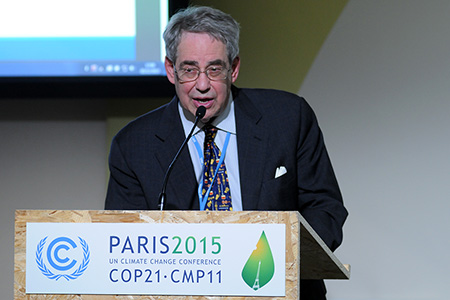 Jan Dash, UUA, spoke on contrarian obstruction tactics including creating doubt around climate science through overemphasizing uncertainty and presenting “research” with no scientific basis.
Jan Dash, UUA, spoke on contrarian obstruction tactics including creating doubt around climate science through overemphasizing uncertainty and presenting “research” with no scientific basis.
| 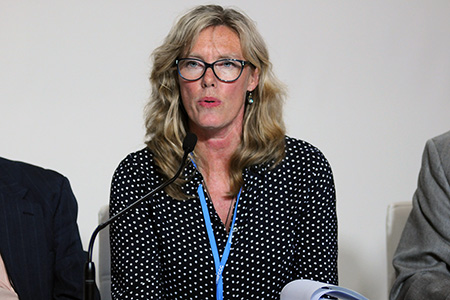 Prue Taylor, University of Auckland, suggested creating an international mechanism to enable stakeholders and other countries to scrutinize INDCs using principles of ethics and justice.
Prue Taylor, University of Auckland, suggested creating an international mechanism to enable stakeholders and other countries to scrutinize INDCs using principles of ethics and justice.
|
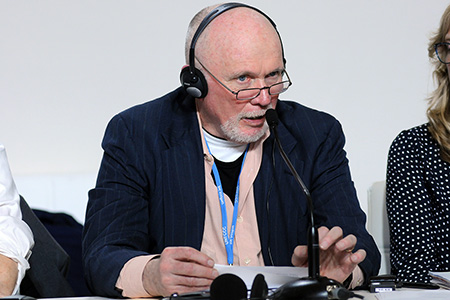 Donald Brown, PERC, called for much more attention from media and NGOs on the ethical issues surrounding policy choices, underscoring that ethics are at the very center of climate change action.
Donald Brown, PERC, called for much more attention from media and NGOs on the ethical issues surrounding policy choices, underscoring that ethics are at the very center of climate change action.
| 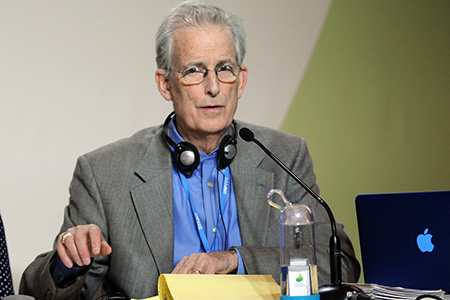 Peter Adriance, National Spiritual Assembly of the Baha'is of the US, pointed to statements from several faith leaders in the past year on the relationship between people and the Earth, underscoring that 80% of the global population profess a faith.
Peter Adriance, National Spiritual Assembly of the Baha'is of the US, pointed to statements from several faith leaders in the past year on the relationship between people and the Earth, underscoring that 80% of the global population profess a faith.
|
 Panel (L-R):
Hugh Breakey, Griffith University; Peggy Clarke, UUA; Jan Dash, UUA; John Dernbach, Widener Law School; Donald Brown, PERC; Prue Taylor, University of Auckland; Peter Adriance, National Spiritual Assembly of the Baha'is of the US; and Peter Burdon, University of Adelaide.
Panel (L-R):
Hugh Breakey, Griffith University; Peggy Clarke, UUA; Jan Dash, UUA; John Dernbach, Widener Law School; Donald Brown, PERC; Prue Taylor, University of Auckland; Peter Adriance, National Spiritual Assembly of the Baha'is of the US; and Peter Burdon, University of Adelaide.
|
Ecovillages: 1001 Ways to Cool the Planet Presented by: Global Ecovillage Network (GEN), Asociación Proteger (PAC) and Green Korea
This side event, moderated by Sarah Queblatin, Global Ecovillage Network (GEN), Philippines, considered the global movement of ecovillages that is helping redesign human habitats towards zero-carbon lifestyles. The session highlighted more than one million people living in ecovillages and transition communities worldwide, many of which are able to assist with disaster relief, refugee resettlement and poverty alleviation.
Geun Jeong Shin, Green Korea, presented on community-based energy transition efforts in Republic of Korea. She said Republic of Korean civilians and NGOs are becoming increasingly concerned about the national government’s plans to expand nuclear energy. She presented a video on the Sungdaegol energy transition village that focuses on: reducing energy consumption; motivating a sense of duty among leaders; and developing systematic education around energy issues.
Richard Siren and Liliana Lewinski, Asociación Protoger, considered the power of small scale solutions in vulnerable, rural contexts in Argentina. They presented the case study of Tekoá Misiones, Argentina, where the construction of an ecoclassroom, nursery room, kitchen and terrace, built using local materials and labor, has had remarkably positive impacts on intercommunity relationships and wider social conditions.
Kosha Anja Joubert, CEO, GEN, explained that GEN aims to support the evolution of sustainable settlements, and now reaches out to 10,000 communities throughout the world. She stated the core element of eco-village design is to embrace both traditional and innovative solutions to not just sustain, but to regenerate life support systems, such as soil fertility, water tables and forest ecosystems. She reported success stories, such as ecovillages in Germany which have successfully lowered their net emissions to 30% of the national average.
Albert Bates, Ecovillage Training Center, Tennessee, US, considered how ecovillages and local communities can go “beyond zero carbon,” underscoring that “the longer the UNFCCC fails to meaningfully act, the more we actually have to go beyond zero emissions.” Highlighting the significant proportion of global emissions coming from land-use change, he outlined the role of biochar, agroforestry and farm-brewed biofuel to build soil nutrient density and sequester significant volumes of atmospheric carbon, saying that, if this work was maximised internationally, it could make a significant difference to global mitigation efforts.
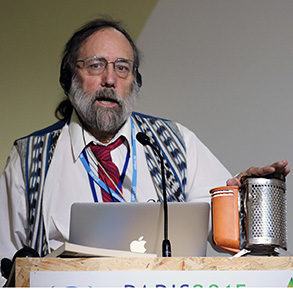 Albert Bates, Ecovillage Training Center, reported on many ecovillages worldwide that are already either carbon-neutral or net carbon-sequestering.
Albert Bates, Ecovillage Training Center, reported on many ecovillages worldwide that are already either carbon-neutral or net carbon-sequestering.
| 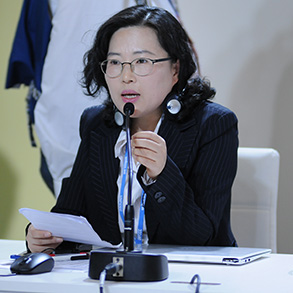 Geun Jeong Shin, Green Korea, said after the Fukushima Disaster several local governments have started moving towards anti-nuclear energy systems, despite national government plans.
Geun Jeong Shin, Green Korea, said after the Fukushima Disaster several local governments have started moving towards anti-nuclear energy systems, despite national government plans.
| 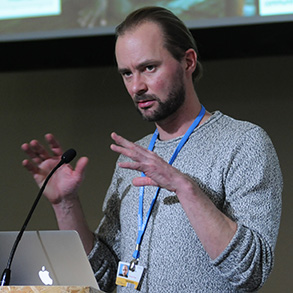 Richard Siren, Asociación Protoger, said “small solutions to resilience can have big impacts if they are done with and for the community.”
Richard Siren, Asociación Protoger, said “small solutions to resilience can have big impacts if they are done with and for the community.”
|
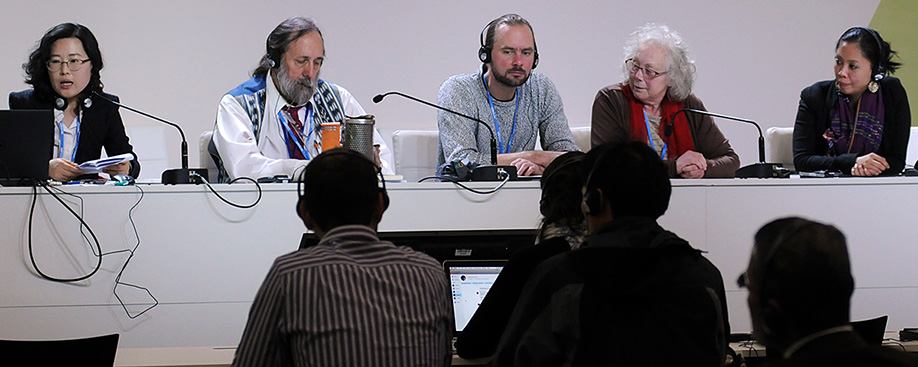 Panel (L-R):
Geun Jeong Shin, Green Korea; Albert Bates, Ecovillage Training Center; Richard Siren, Asociación Protoger; Liliana Lewinski, Asociación Protoger; and Sarah Queblatin, GEN.
Panel (L-R):
Geun Jeong Shin, Green Korea; Albert Bates, Ecovillage Training Center; Richard Siren, Asociación Protoger; Liliana Lewinski, Asociación Protoger; and Sarah Queblatin, GEN.
|
Contacts:
- Sarah Queblatin (Moderator) | sarah.queblatin@gmail.com
- Richard Sirén (Panelist) | richard.siren@gmail.com
- Geun Jeong Shin (Panelist) | minimu0@gmail.com
More Information:
Climate Change Planning in Conflict Settings: the State of Palestine Presented by: State of Palestine
This event, moderated by Jameel Mtour, Environment Quality Authority, Palestine, considered climate change planning in situations of conflict.
Nedal Katbeh-Bader, Palestine, spoke on Palestine’s climate change planning under occupation. He highlighted Palestine’s climate change adaptation strategy, noting that Palestine is an observer state in the UN Framework Convention on Climate Change (UNFCCC), and welcoming Belgium’s €1.4 million contribution to the implementation of the adaptation strategy. He highlighted numerous challenges faced by the State, particularly the inability to control natural resources and land fragmentation.
Johan Schaar, Consulate General of Sweden in Jerusalem, spoke on Swedish climate change and development cooperation in Palestine. He stressed that issues of political action and efforts to combat climate change “cannot be divorced,” calling for a holistic view of resilience, and stressing the need to bridge the gap between the knowledge communities dealing with climate change and conflict. He highlighted investment risks in Palestine, noting that they hinder the implementation of adaptation and mitigation technologies.
Sarah Kuen, Climate Change Policy Advisor, Belgium, underscored the importance of mainstreaming climate change in all activities and enhancing the capacity of the Palestinian authority to do so. She reported on concrete cases of cooperation, including an eco-sustainable school in Hebron and the development of a GHG inventory, an essential tool for constructing a national Monitoring, Reporting and Verification system.
Rima Abu Middain, UN Development Programme/Programme of Assistance to the Palestinian People (UNDP/PAPP), provided an overview of UNDP/PAPP’s work on environment and climate change in the region and identified main challenges, inter alia: the Israeli occupation and the conflict context; emergency and humanitarian context versus development needs; lifesaving and early recovery needs versus long term impacts; competing needs and priorities that fail to prioritize environmental concerns; regional competition for resources and lack of control of Palestine over its land and natural resources; limited interest of donors; and lack of access to project funding from the Global Environment Facility and climate-related donors.
Jacqueline McGlade, UN Environment Programme (UNEP), presented on sustainable consumption and production (SCP) and climate change in Palestine, and stressed the need to implement elements of a circular economy in order to address climate change. She highlighted opportunities for Palestine under the SWITCH-Med initiative, including the development of an SCP national action plan, and strategies to encourage green entrepreneurship.
Otto Simonett, Zoï Environment Network, presented a report on Environment, Security and Climate Change in Palestine, calling for: further assessments on the links between climate change and security; communicating facts in an accessible manner to attract the attention of civil society and media; and action on the ground to demonstrate work being undertaken to combat climate change.
In the ensuing discussion, participants considered, inter alia: whether framing climate change as a security issue is an opportunity for Palestine; the need for the establishment of an environmental database in the region; and the importance of support in the up-scaling of renewable energy technologies.
Closing the session, Salman El-Herfi, Palestinian Ambassador to France, welcomed support for Palestine’s efforts to combat climate change, noting that “occupation is the enemy of the environment.”
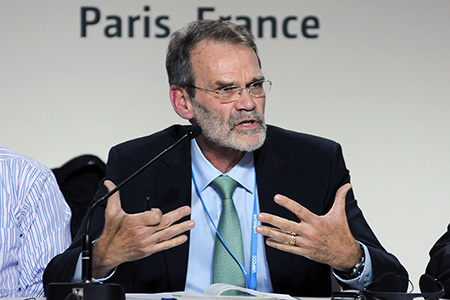 Johan Schaar, Consulate General of Sweden in Jerusalem, stressed the need to bridge the gap between knowledge communities dealing with climate change and conflict. Johan Schaar, Consulate General of Sweden in Jerusalem, stressed the need to bridge the gap between knowledge communities dealing with climate change and conflict. | 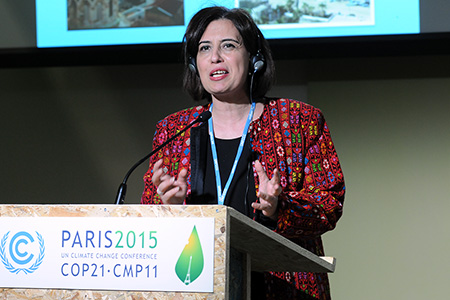 Rima Abu Middain, UNDP/PAPP, stressed that, despite the challenges, opportunities still exist as the Palestinians are very resilient and have huge adaptive capacities.
Rima Abu Middain, UNDP/PAPP, stressed that, despite the challenges, opportunities still exist as the Palestinians are very resilient and have huge adaptive capacities.
|
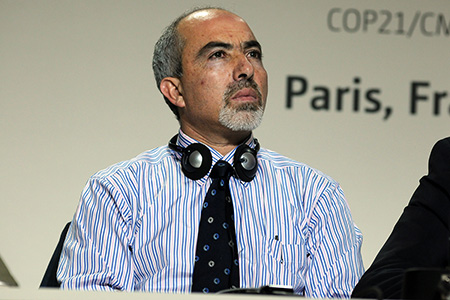 Nedal Katbeh-Bader, Palestine, highlighted climate impacts experienced in Palestine, including increased risk of drought, risks to public heath, and decrease agricultural productivity.
Nedal Katbeh-Bader, Palestine, highlighted climate impacts experienced in Palestine, including increased risk of drought, risks to public heath, and decrease agricultural productivity.
| 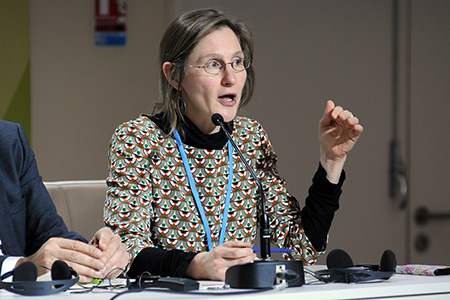 Sarah Kuen, Belgium, presented cases of cooperation, illustrating essential aspects of climate action.
Sarah Kuen, Belgium, presented cases of cooperation, illustrating essential aspects of climate action.
|
 Panel (L-R):
Jacqueline McGlade, UNEP; Nedal Katbeh-Bader, Palestine; Johan Schaar, Consulate General of Sweden in Jerusalem; Jameel Mtour, Environment Quality Authority, State of Palestine; Rima Abu Middain, UNDP/PAPP; Otto Simonett, Zoï Environment Network; and Sarah Kuen, Climate Change Policy Advisor, Belgium.
Panel (L-R):
Jacqueline McGlade, UNEP; Nedal Katbeh-Bader, Palestine; Johan Schaar, Consulate General of Sweden in Jerusalem; Jameel Mtour, Environment Quality Authority, State of Palestine; Rima Abu Middain, UNDP/PAPP; Otto Simonett, Zoï Environment Network; and Sarah Kuen, Climate Change Policy Advisor, Belgium.
|
Contacts:
- Nedal Katbeh-Bader | n72065@hotmail.com
- Viktor Novikov | viktor.novikov@zoinet.org
The Earth Negotiations Bulletin on the Side (ENBOTS) © <enb@iisd.org> is a special publication of the International Institute for Sustainable Development (IISD). This issue has been written by Lynn Finnegan, Tallash Kantai, Gillian Nelson, Ph.D., Annalisa Savaresi, Ph.D., and Asterios Tsioumanis, Ph.D. The Digital Editors are Naomi Devine and Brad Vincelette. The Editor is Dan Birchall <dan@iisd.org>. The Director of IISD Reporting Services is Langston James “Kimo” Goree VI <kimo@iisd.org>. The Sustaining Donors of the Bulletin are the European Union, the Government of Switzerland (the Swiss Federal Office for the Environment (FOEN), the Swiss Agency for Development and Cooperation (SDC)), and the Kingdom of Saudi Arabia. General Support for the Bulletin during 2015 is provided by the German Federal Ministry for the Environment, Nature Conservation, Building and Nuclear Safety (BMUB), the New Zealand Ministry of Foreign Affairs and Trade, SWAN International, the Finnish Ministry for Foreign Affairs, the Japanese Ministry of Environment (through the Institute for Global Environmental Strategies - IGES), the United Nations Environment Programme (UNEP), and the International Development Research Centre (IDRC). The opinions expressed in ENBOTS are those of the authors and do not necessarily reflect the views of IISD and funders. Excerpts from ENBOTS may be used in non-commercial publications only with appropriate academic citation. For permission to use this material in commercial publications, contact the Director of IISD Reporting Services at <kimo@iisd.org>. Electronic versions of issues of ENBOTS from the Paris Climate Change Conference - November 2015, can be found on the IISD Reporting Services website at http://enb.iisd.org/climate/cop21/enbots/. The ENBOTS Team at the Paris Climate Change Conference - November 2015, can be contacted by e-mail at <tallash@iisd.org>. |
||
|
IISD Reporting Services is grateful to the many donors of the Earth Negotiations Bulletin (ENB) and recognizes the following as core contributors to the ENB: the European Union, the Finnish Ministry for Foreign Affairs, the German Federal Ministry for the Environment, Nature Conservation, Building and Nuclear Safety (BMUB), the International Development Research Centre (IDRC), the Japanese Ministry of Environment (through the Institute for Global Environmental Strategies - IGES), the New Zealand Ministry of Foreign Affairs and Trade, the Kingdom of Saudi Arabia, SWAN International, Government of Switzerland (the Swiss Federal Office for the Environment (FOEN), the Swiss Agency for Development Cooperation (SDC), and the United Nations Environment Programme (UNEP). Funding for translation of the Bulletin into French is provided by the Government of France, the Wallonia, Québec, and the International Organization of La Francophonie/Institute for Sustainable Development of La Francophonie (IOF/IFDD). |
||